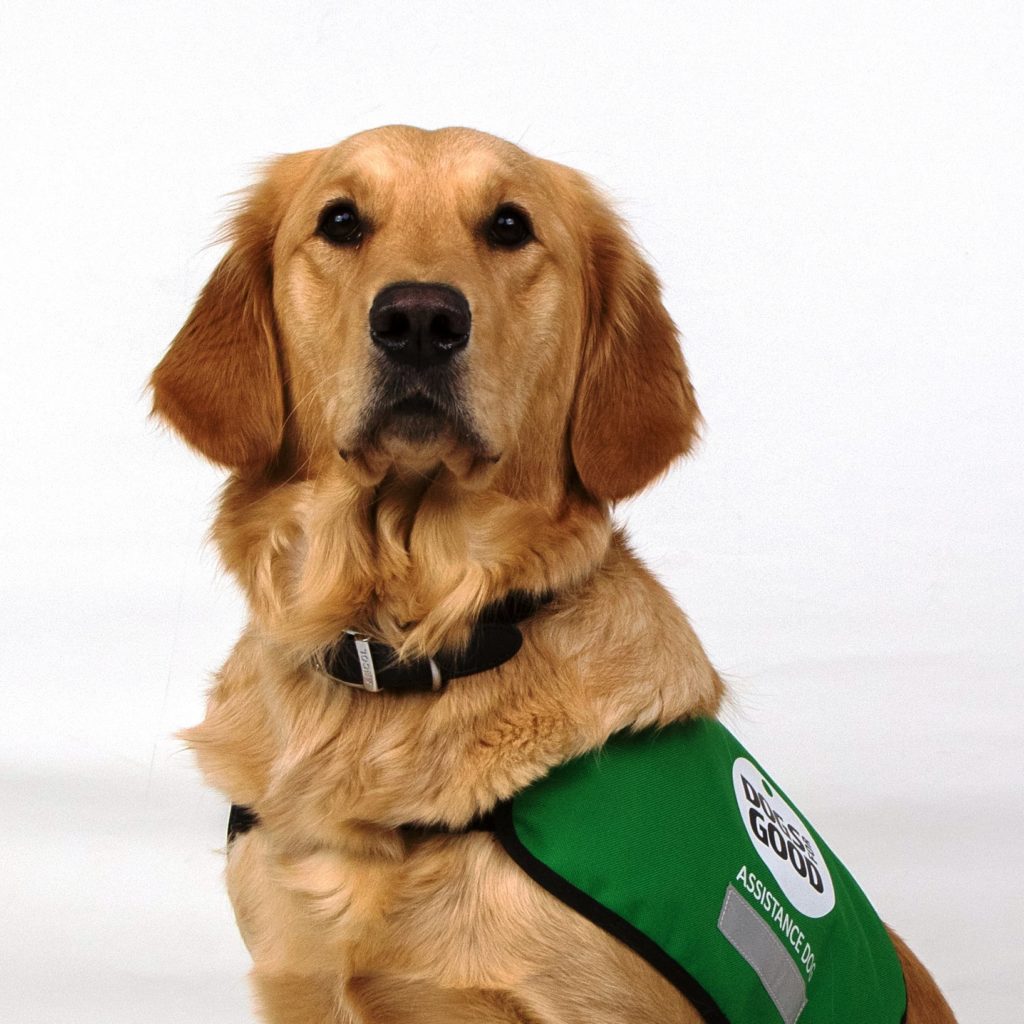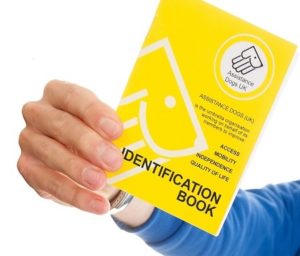At ADUK we believe in empowering service providers to go beyond simply meeting their legal obligations so that they can become actively inclusive and welcoming of people who rely on assistance dogs.
ADUK has created and curated information and resources for service providers which cover a wide range of topics based on questions that we are frequently asked.
If you can’t find what you are looking for, check out our general information page.

The Equality Act 2010 and Disability Discrimination Act 1995 (NI) require that disabled people have the same rights to services such as accommodation, restaurants, pubs and cafes as everyone else.
The Equalities Act 2010 and Disability Discrimination Act 1995 (NI) say that reasonable adjustments must be made in order to avoid discriminating against disabled people.
These reasonable adjustments will range from creating an access route for a person with a wheelchair to modifying a “no dog’s policy” in order that a disabled person may be accompanied by their assistance dog.
Assistance dogs trained by ADUK member organisations perform practical assistive tasks for their disabled partners or alert to life-threatening medical conditions to enable their owners to be independent.
For this reason, it is reasonable to allow assistance dogs to accompany their owners into most situations where pet dogs would not be permitted, or for service providers to make reasonable adjustments in providing safe and secure accommodation for a dog and support for its handler in the dog’s absence, in, for example, an infection control clinical setting.
A disabled person should not be put at a disadvantage due to their assistance dog. For example, a disabled person should not be asked to sit in a specific area to keep the dog out of the way or asked to pay an additional fee for cleaning.
The Equality and Human Rights Commission have produced a guide that informs businesses of their legal obligation to allow access to assistance dogs. Download and read ‘Assistance Dogs, A guide for Business.
The Equality Act lays out that in relation to protecting the rights of a disabled people when accessing private hire transport, an Assistance dog means
(a) a dog which has been trained to guide a blind person;
(b) a dog which has been trained to assist a deaf person;
(c) a dog which has been trained by a prescribed charity to assist a disabled person who has a disability that consists of epilepsy or otherwise affects the person’s mobility, manual dexterity, physical coordination or ability to lift, carry or otherwise move everyday objects;
(d) a dog of a prescribed category which has been trained to assist a disabled person who has a disability (other than one falling within paragraph (c)) of a prescribed kind.
The Equality and Human Rights Commission states that assistance dogs:
- are highly trained
- will not wander freely around the premises
- will sit or lie quietly on the floor next to its owner and are trained to go to the toilet on command and so are unlikely to foul in a public place
- Most are instantly recognisable by the harness or identifying dog jacket they wear they wear.
It is not a legal requirement for Assistance Dog users to provide ID but all ADUK members issue the people and dog partnerships they work with ID booklets.
Not all assistance dogs are trained by ADUK members or candidates.
Assistance dogs trained by member organisations of ADUK will have formal identification in the form of
- ID tags on the dog’s collar
- a harness
- an organisation-specific branded dog jacket or harness
- a lead slip
Whilst all ADUK member trained assistance dogs will wear one, it is not a legal requirement for assistance dogs to wear a harness, jacket or lead slip.
People who have an assistance dog from an ADUK member organisation will also have a yellow ADUK branded Identification Booklet. This Booklet has been designed to support assistance dog owners with their access to goods, facilities and services, as defined in the Equality Act 2010 (EA2010) in England, Scotland and Wales, and the Disability Discrimination Act 1995 (DDA 1995) in Northern Ireland.

The ID book contains information about the owner and their dog, details of the training organisation that trained the dog and its owner.
It also has information about equality and disability law (specifically the EA2010 and DDA 1995) and the elements which support the rights of assistance dog owners and their dog, especially when accessing goods, facilities and services.
ADUK has also produced a window sticker, enabling service providers to show they welcome assistance dogs and understand their obligations to assistance dog owners under the Equality Act 2010 and the Disability Discrimination Act 1995 (NI).
More and more employers are considering making their place of work dog friendly. Alongside this, it is important to distinguish between allowing employees to bring their pet dogs to work, and the legal obligations that employers have regarding disabled employees who rely on an assistance dog.
If an employer is considering becoming more pet friendly, they might want to consider how having multiple dogs in the workplace will impact on an assistance dog and their handler.
ADUK has created a guide to introduce employers to the topic of welcoming assistance dogs to the workplace.
Read ADUKs Quick Guide on Welcoming Assistance Dogs in the Workplace.
In the UK the lack of clarity about what legally constitutes an assistance dog which makes it hard to define what standards of training must be met.
ADUK members work to the highest international standards of training and welfare.
Disabled people who train their own assistance dogs, or those who have an assistance dog trained by non-ADUK members, have the same rights as those that have an assistance dog trained by one of our members.
The Equality and Human Rights Commission, in its guidance on the matter, states that assistance dogs:
- are highly trained
- will not wander freely around the premises
- will sit or lie quietly on the floor next to its owner and are trained to go to the toilet on command and so are unlikely to foul in a public place
- Most are instantly recognisable by the harness or identifying dog jacket they wear they wear.
Under the Equality Act 2010, it is against the law for service providers, including landlords, rental agencies and housing associations to treat disabled people less favourably because of their disability, or because they rely on an assistance dog or guide dog.
Landlords, rental agencies and other housing providers must make reasonable adjustments for disabled people who use assistance dogs.
A landlord may be required to make changes to any policies or practices they have which may disadvantage a tenant because of their disability. This includes making changes to a tenancy agreement. For example, saying pets are not allowed in the property should be changed to allow a disabled person to have their assistance dog.
A landlord cannot increase rent or charge additional cleaning fees to assistance dog or guide dog owners, even if a contract states they charge extra for pet fees. An assistance dog should not be treated as a pet in this context. Charges for actual damage caused by the dog can be made.
There is no register or certification process for assistance dogs in the UK. Whilst all assistance dogs trained by members of ADUK are issued an ADUK Identification Booklet, not all assistance dog owners have papers or ID, nor do they require ID by law.
The Equality and Human Rights Commission has produced a useful resource that outlines peoples rights to accessible housing. Included in this guide is a case study involving an assistance dog owner.
For more information read ‘Accessible and
Adaptable Housing in England: A guide for disabled people and the organisations that support them’.
Disabled people that use assistance dogs have important rights under the Equality Act 2010. The law protects people with disabilities to ensure that they can enjoy the same rights as everyone else to use the services supplied by shops, banks, hotels, libraries, pubs, taxis and restaurants.
Service Providers, including schools, must make reasonable adjustments for disabled people who use an assistance dog in order for them to access their services or venues.
Some assistance dog owners will want to accompany their children onto the school grounds whilst using their assistance dog. Anyone who has received training from an ADUK member will have been encouraged to have a conversation about this with the school in question before they bring the dog onto the grounds.
If a school has concerns about the behaviour of an assistance dog or believes that there is a risk to the safety of the children, they would have reasonable cause to have a conversation with the assistance dog’s owner about how to eliminate such risks.
The Equality Act 2010 and Disability Discrimination Act 1995 (NI) require that disabled people have the same rights to services such as accommodation, restaurants, pubs and cafes as everyone else.
It includes a duty to make reasonable adjustments to ensure that disabled people can access services.
Allergy to dogs is sometimes given as a reason for not admitting assistance dogs.
While the prevalence of allergies generally is increasing worldwide, and is of course, not an issue to be taken lightly, the incidence of allergies to dogs may be less than perhaps commonly thought.
In the UK, it estimated that approximately 8% adults are sensitive to dog allergens, while it is estimated that up to 4 times as many people are allergic to pollen and house dust mites.
Where a clear allergy risk to a specific individual can be objectively identified by an establishment, steps should be taken to reduce this risk, for example by accommodating an assistance dog and handler in a separate part of the room or by getting non dog allergic staff to take over serving duties.
Refusal of access for assistance dogs based on the possibility that other people ‘may’ be allergic is unlikely to be classed as a reasonable or proportionate response.
For more information about Allergens and Allergies to Dogs please click on the links below for more information.
Common Allergens and Allergic Reactions to Dogs Report (PDF)
Allergy UK; A Quick Guide to Pet Allergies (external link opens in new window)